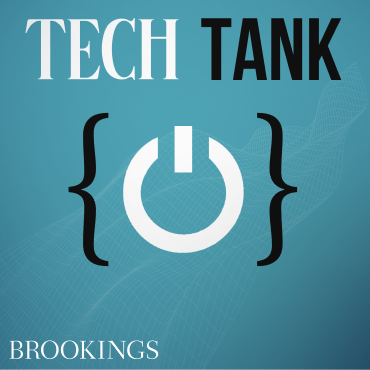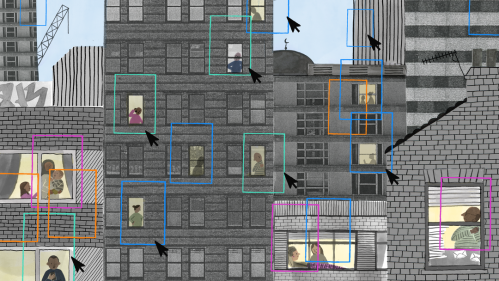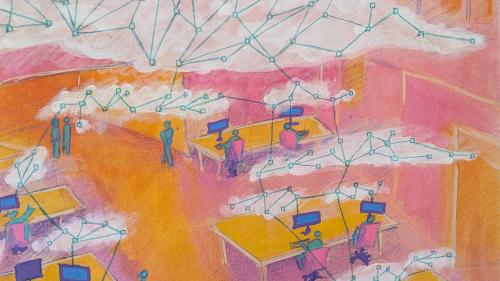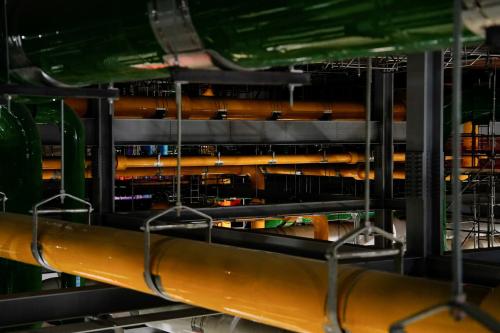TechTank, a biweekly podcast from the Center for Technology Innovation at Brookings, explores today’s most consequential technology issues. Moderators Nicol Turner Lee and Darrell West speak with experts and policymakers to share data, ideas, and policy solutions that address the challenges of our digital world.
Marketplaces have long brought people together to buy, sell, and speak to one another. In his new book, “The Age of Extraction: How Tech Platforms Conquered the Economy and Threaten Our Future Prosperity,” author Tim Wu refers to the conveners of such activities as platforms. Over the years and with the accelerated deployment of technology, platforms have come to look different in the digital age, especially as technology companies have become the gatekeepers of how people transact and communicate in the public and private spheres.
As these companies consolidate immense economic and cultural power, Wu argues that they have gained unprecedented influence over consumers and the economy, especially amid the rise of artificial intelligence. This dynamic has led to serious debate around how platforms can be held accountable, engage consumers in a more democratic manner, and allow competition into a marketplace consumed by powerful companies.
In this episode of the TechTank Podcast, co-host Nicol Turner Lee is joined by Tim Wu, the Julius Silver Professor of Law, Science, and Technology at Columbia Law School, to discuss his new book, “The Age of Extraction: How Tech Platforms Conquered the Economy and Threaten Our Future Prosperity” and the future of regulating online platforms.
Listen to the episode and subscribe to the TechTank Podcast on Apple, Spotify, or Acast.
Transcript
CO-HOST NICOL TURNER LEE: [00:00:00] You are listening to Tech Tank, a biweekly podcast from the Brookings Institution exploring the most consequential technology issues of our time, from racial bias and algorithms to the future of work Tech Tank takes big ideas and makes them accessible.
Welcome to the Tech Tank Podcast. I’m co-host Nicol Turner Lee, the director of the Center for Technology Innovation, the founder of the AI Equity Lab and the publisher of the Tech Tank blog at the Brookings Institution. Today’s episode, we’re gonna talk about big tech companies. Yeah. Who doesn’t talk about big tech companies today? We’re gonna do it again. For those of you who are not tired of hearing us talk about big tech companies, big technology companies have consolidated immense and. Economic and cultural power accounting for 80% of U.S. stock gains this year. Their platform shape how people communicate, access, information, and participate in democracy in the private and public spheres.
Private platforms are increasingly acting as gatekeepers for online speech while policymakers like myself and courts, which are way above my pay grade debate how First Amendment principles apply to content moderation at the same time. Consolidation across the tech industry has concentrated unprecedented influence and a small group of companies that now dominate digital advertising, search engines, cloud services, and data infrastructure. There’s a lot going on here with regards to tech companies. My colleague Darrell West and I just generated a paper on data centers, but today. We wanna talk a little bit about platforms and I’m really excited to be joined by someone that I know I’ve been a fan of and watched his work over the years since I’ve been in tech Policy for the last 30 plus, and that is Tim Wu.
Tim is Julius Silver Professor of Law, science and Technology at Columbia Law School. He’s here to discuss his new book, “The Age of Extraction, How Tech Platforms Conquered The Economy and Threaten Our Future Prosperity,” which is now available at a bookstore near you. Now Tim served as a special assistant to President Biden for technology and competition policy from 2021 to 2023. I believe that was the second time Tim was in the White House, and he’s a leading scholar on antitrust and tech regulation and the author of other influential books on the Attention Economy and Corporate Power, including The Curse of Bigness, antitrust, and the New Gilded Age. And the Attention Merchants, the epic scramble to get inside our heads.
Wow. Yeah, we’re gonna talk about that today. Who’s getting inside our heads? Hey Tim, thanks for joining me today.
GUEST TIM WU: Great to be here.
CO-HOST NICOL TURNER LEE: I gave an brief, overview of how platform consolidation and digital monopolies are shaping today’s [00:03:00] economy. And it’s something I think you do very well in the book, but I wanna give you a chance to justify why you get to write on this topic, right?
You’ve been studying this dynamic for years. What drove you to write this book now? Because, you know that’s, you’re in the middle of stuff, my friend.
GUEST TIM WU: Yeah, it’s a good question. I guess this book, I, wrote it ’cause I lived through it. I think, I was one of these people and I, there were a lot of us who were just incredibly optimistic about the early internet and what it was gonna do for everybody.
It was gonna make us all rich. It was going to bring democracy to every country on earth. It was gonna improve government. It was going to. give every creative person a, a space to reach an audience. it was an era of great optimism. I guess I’m talking about the nineties, early thousands.
CO-HOST NICOL TURNER LEE: Exactly.
GUEST TIM WU: And, I wanted to know what happened. So this book is the story of the last, 20 years or so, maybe 25 years of, the dream of the internet. And then, what happened, to, to wreck it essentially.
CO-HOST NICOL TURNER LEE: So what’s so interesting about that, and I, I have a an idea too and I’d love to talk about you ’cause I, consider us to be the early OGs Tim, right? People who really started to look at the commercial internet in its earliest form. myself on the digital divide side of course. But, looking back. What lessons do you think we missed in that conceptualization of the open internet to get to this period of data extraction or, really the app title of your book, the Age of Extraction?
GUEST TIM WU: Yeah, that, that’s a good question. I, think in that, I think I would talk about two things from that early optimistic age. So thing number one, was this great faith or trust. And the individual founders of the internet, like the Google guys or, even Jeff Bezos, some sense that their motives were uncommercial or somehow very, open-ended and that, that they wanted everybody to be rich as much as they wanted themselves to be rich. In other words, like I, I think that was one kind of big mistake. So a lot of, my most idealistic friends, for example, went to work at Google. Or Facebook. And when I think about it now, maybe they should have been starting a nonprofit version of those things or something. And so that’s one. I think another thing, this is slightly more academic point, it’s a little to the digital divide, is we had this, idea that platforms are gonna stay open forever. And I think because the internet was industry was itself an open platform and it was built on the web. we didn’t realize the growing power of the main platforms.
And here what I mean is [00:06:00] Google, Amazon, Facebook, so forth. There was a misunderstanding of scale and platform power, and one of the sort of academic points in my book is we really need to understand platform power better.
CO-HOST NICOL TURNER LEE: And talk to us a little bit about platform power, because I think it’s so interesting in the book, and I had the opportunity to read it myself, so thank you for this contribution is you talk about this shift of the internet and then you look at platforms as, I’m trying to think of the way to, to talk about it, but it’s almost like how fungus grows, right? Or yeah. This other life that sort of takes over the internet, which is so interesting, right? Because in the history of industrial policy, the internet has always been cleaved to all of its byproducts. And in this case you talk about this outgrowth, which has its own, ecosystem, first defined for people. How you’re looking at a platform, so what is it, right? Yeah. For those people who wanna know first, and then I want you to talk a little bit about, how they affect the competition that we saw on the internet, as well as, cultivate these dependencies that we see now. Yeah, those are big questions.
GUEST TIM WU: So I, I guess most of us, we think about a normal business. You think of it a business that either, sells something or, provides a service or produces something, maybe like a shoemaker or a shoe store. Or, I don’t know tho those are normal or hair salon or something. A platform is a different kind of business ’cause it hosts the behavior or the conduct of others. it is, like the stock market is a, platform business, in the old days, operated by the city, like a city marketplace. Is a platform kind of business. And it’s a weird, it’s a different kind of business.
It brings together buyers and sellers. And it has traditionally, or for most of civilization actually been more or less a public function, something done by the government, mainly or space provided by the government. And I think what we never really realized in the early internet days and we maybe should have, but I, think we had, a regulated telecom network and we had Microsoft that had just been beaten up by the Justice Department, didn’t fully realize how dangerous and important the power of the platforms would become.
CO-HOST NICOL TURNER LEE: Yeah, and when I think about it, and I want people to understand this, you don’t just talk about the social media platforms in the book. You talk about these, marketplaces like Amazon and others. Yeah. That sort of capitalize off of data and okay, I wanna push this a little bit. You talk about.
Exchange, right? Yeah. The transactional capacity of exchange that sort of lightens a load for others. Talk a little bit about that codependency. Yeah. That comes along with platforms.
GUEST TIM WU: Yeah, no, that’s a good way of putting it. So platforms are essential to [00:09:00] actually, frankly, any kind of commerce. and every country, every civilization has centralized some kind of platform. Iin the book I talk about the ancient, Greece has in the center of every city, or they have in the center of every city, there’s a big giant square where everybody buys and sells and also give people, give speeches and so there, there’s always been the, these platforms and they’ve always been really important, but they have a particular power.
Once someplace is the place where everyone buys and sells, it’s very hard to go to alternatives. This is something you’ve seen with the Amazon marketplace, Amazon sellers. it’s gotten harder and harder to business on Amazon or make any money. It’s mainly Chinese sellers who are really able to make money.Some Americans, ’cause they just keep changing, but everyone’s caught on both sides. if you’re a buyer, all the good stuff is there and the most sellers are there. And if you’re a seller, you want to meet, reach the, audience. You have to go there. So it’s like a place, it’s so crowded. I would, I, don’t know the right joke exactly, but you can’t get away from it ’cause everybody’s there. And so we’re trapped.
CO-HOST NICOL TURNER LEE: And in the book, I find it fascinating as well. You talk about, the analogy with a fig tree. Tim, I didn’t know you had a green thumb, or is this just a fig tree that just happened to be in front of your house? I just need more data on this.
GUEST TIM WU: Actually. I did have it when I lived at my very first job in Charlottesville, Virginia, and I was at the University of Virginia, a first job in academia. there was just a fig tree in my yard. And you I just gave off so much fruit. I couldn’t believe it. And I think anybody who’s had a really productive, I, there’s something deeper in there than just wow, that’s a lot of fruit.
there is, by their nature a lot of surplus in most productive, facilities. And so there’s, this, meaningful way that even the small family farmer will have extra to trade. And I’m a big believer that’s the source of independent wealth. And now that. relates us back to the platforms because if you’re gonna sell your stuff, it’s always gonna have to be on some kind of platform. But if the platform takes too much, it’s very hard to become wealthy.
CO-HOST NICOL TURNER LEE: And that was the interesting part about it, right? Beause when I was a little girl, we used to run down to the farmer’s market, where I grew up.
And my mother to this day still loves the farm market near her home. and part of. As your point is with technology is that, they bought the trade to the market. And with the analogy of your fig tree, what do you do in this surplus? you have to find other ways to get it past the farmer’s market, essentially. Yeah. And it seems the platforms came at a time where we needed this, connection, between individual actors and businesses, and then ways to distribute out further. ’cause you remember back in the days, they used to say the internet was a value add because you could get beyond your borders, right? Yeah. It was like the marketplace without borders. So [00:12:00] clearly, like the platform economy on the tech side was inevitable, because of its power. But what’s so interesting, I think is like what I enjoyed about the book is like the shift, right? Which starts out as this inevitable, marketplace that was going to evolve with the, Commercial internet, and then the platforms become greedy, right? And they become, create this codependency for the small entrepreneurs and businesses, Part of what we had in the past, and this is something that you’re very familiar with based on your research, is that we had government agencies to help reel in market power and consolidation and things like that. You mentioned in your book that there’s this diminishing power of enforcement by federal agencies, and the traditional oversight of tech companies has been very convoluted. as we go through various administrative regimes, I’m curious like. How did that sort of get to you, to where you were in the book in terms of going from a productive economy to an extractive one? Because I find that to be fascinating.
GUEST TIM WU: So first of all, I think you have sketched the narrative very well, which you have this,
CO-HOST NICOL TURNER LEE: I read the book, Tim, I read it. I told you
GUEST TIM WU: I know. Yeah. you have this, wonder, you have this sort of wondrous, amazing technology that, as you say, very, productive and for a while, it really is the dream come true. if I look at Amazon, 15 years ago, and you’re a seller on Amazon, it’s very easy to make money. Amazon’s only taking 20%. Now Amazon’s taking more than brick and mortar retail to be there. they actually, it’s like everything else. They just turn the dial on the prices, and if you have noticed as a consumer, it’s not actually cheaper anymore either. But the sellers, it’s even, tougher. So yeah, there, there is this, progression and there is no discipline or oversight. one of the things I, thought about writing this book, it was like, what if we rer the clock on electricity and, we have these electric companies and they put electricity in every these houses.
And like at first it’s amazing and wow, we can do all this stuff. Then all of a sudden they just keep turning up the prices and turning it up and then they start saying, we’ve decided you can only use our refrigerators and not somebody else’s. And then you can’t plug that in. And I don’t know, like you, you realize that in every essential network there’s a lot of potential power. And in the actual case of electricity networks, they’re very heavily regulated. ’cause everybody was like. You can’t just have an essential company, do whatever it wants yet somehow we feel that’s fine with the tech platforms that we’re so dependent on.
CO-HOST NICOL TURNER LEE: and that’s so interesting because, you may talk about the commerce example as one area in which platforms have consolidated the exchange of goods and services. But then I thought it was also interesting you talk about social media as well, right? in particular sort of co commoditizing the exchange of. More personal information and data. Talk to, me [00:15:00] about are they different in terms of extraction or are they pretty much the same? Which is the argument you want to convey with people?
GUEST TIM WU: that’s a good question I think the basic idea that you exercise power is the same and you wanna keep people there is the same. I think the difference is in the business model. at Amazon is more about extracting fees and. taking a lot from the sellers and the, social media platforms. They are in the business of extracting data and attention. That they can resell to advertisers. This was actually my second book. The, attention Merchants was the long story of basically finding, and mining attention from, the 20th, the entire 20th century story of the attention economy. And so I think the difference is just in some technical level, the commodity that they’re taking but all of them take data, but the attention of the social media networks feed on. Attention that they then can resell to other, other to advertisers.
CO-HOST NICOL TURNER LEE: And what’s so interesting about this, in terms of the social media people, and I learned a new term in your book called Couch Lock.
GUEST TIM WU: I think it’s good you learned that from me.
CO-HOST NICOL TURNER LEE: I did. I, I, was like, okay, couch lock. Okay. I think I’m. Probably guilty of this as well. You go deeper, which is, also the framework of many conversations we’re seeing today, right? This pushback on social media companies and children’s privacy. this conversation around, whether or not we should reform Section 230. Which sort of indemnify social media companies from any type of harm that comes from their platforms. why is all of this important, particularly in the regulatory landscape, when you start thinking about just how codependent, and I like the way you’ve phrased it from your previous book, how much attention individuals are giving to these platforms.
GUEST TIM WU: I guess I return to the point. It’s strange to have entities that so powerful. so much access to data attention. us so captive and to just let it all hap go out. and I think it’s not only us as consumers, I think the rest of the economy is increasingly starting to feel it.
the news business already has taken, had a lot of, its, money essentially taken by the, platform companies. Most sellers and producers are filling their margins. Shrinking. there’s this sort of risk that we become an economy where the only companies that make money are finance and tech, and the people who make anything are, just not really in a position to make money, ’cause they’re, they are many, while finance and tech are just a few, and, In the real world, the many beat the few. But in economics and business, the few [00:18:00] beat the many, if they’re, concentrated enough.
CO-HOST NICOL TURNER LEE: but it’s so interesting, right? Because back in the days, that same argument could have been made and, I think you pointed out in your book for IBM or Motorola, and other.
Companies that came out at the nascent period when, tech was creating its own identity. I, call these companies you’re referring to the teenagers, right? Yeah. Compared to the grandfathers, and grandmothers of technology, What is so different from what these tech companies are doing compared to, and you mentioned this previously, the Microsoft and Bill Gates conceptualization of the operating system, or, IBM when it came out with the mainframe and wanted to do more operating, software. What’s different today? because, to me, I, can’t put my finger on it, Tim, right? Because now we’re looking at AI and I think that’s just really Making this much more of an accelerant in terms of an, the concentration of power in tech and finance. But, how do you, reconcile this? What happened?
GUEST TIM WU: I, feel that, I, believe in a couple things. I believe that there’s nothing truly new under the sun. And I also believe the history works in giant cycles and Silicon Valley in some level has become the problem it was trying to solve. think about that old Apple ad in the eighties.
I don’t know if maybe listeners aren’t old enough to realize, but Apple was once this, just as an example, anti-monopoly company and it w Silicon Valley itself was all about trying to fight a few big centralized companies like AT&T and IBM or whatever. And I think they have become, they are those companies now, they’ve replaced them in some ways they’ve perfected some of the techniques that those companies used. And yeah, I, in some way, obviously their technologies are different. They are new, they’re more reliant on platforms, they’re much more sophisticated at preventing people from leaving. But at another level, the whole idea of domination and having customers who cannot leave you, is a similar goal across, all this, period of history.
CO-HOST NICOL TURNER LEE: Yeah, no, I think you’re right. I think it, it’s the mirror is before these new companies, which are reflections of the other companies, which is why we both love tech, right? Because it’s such a disruptive space with endless possibilities for research and policy. Which is, again, when you think about this particular political regime, do you find it interesting that this particular, regime is actually continuing some of the antitrust work, that was started in the Biden administration?
GUEST TIM WU: Yeah. yes, I’m pleased and I think some of their filings very good. The lawyers are very good. The only thing I’m always afraid of, I, I just don’t understand, [00:21:00] how, I don’t understand if this particular administration. is going to, takes things to their complete point, or whether it’s just a question of getting enough of a price. And that’s what makes me a little bit concerned. But, at least for now, the lawsuits are still rolling. I think it’s amazing how few people actually realize that, there was an entire trial of Facebook in February and it got a little bit of coverage, but. there’s, always so much going on, I know, national Guard occupying DC or something else happening.
There’s so much going on that, like something that would’ve been headline news in the nineties or in the eighties is oh yeah. And they’re, trying to break up Facebook. Yeah. I, bet you if you had to poll how many Americans know that the US federal government is trying to break up Facebook, or at least has filed a suit that, that would do that. I, don’t know, 1% maybe antitrust nerds and a few tech Really intense. people who watch tech very carefully.
CO-HOST NICOL TURNER LEE: Yeah, I know it’s, we just actually published a piece by, David Brody who is looking at, one of the cases against Meta and just explaining it for the general public. So I’m curious to see if that’s, something people will be interested in because to your point, we’re just bombarded by so many other issues. But I also think, I don’t wanna gloss over what you said. Some of this could be the extraction of money. In terms that’s, I don’t wanna, I don’t wanna replace the, word extraction with extortion, but it’s almost like the tech companies and the levied fines that we’re currently seeing are being done intentionally. So there could be an intentionality about continuing what was started in the Biden administration as well.
GUEST TIM WU: I know, I, the, part of me that’s most afraid is that it will become just as cudgel for no, for basically pressuring the tech companies. Yep. To say, for example. ensure the reelection of President Trump or something like that. Yeah. Like some, like the, prize will, a couple million dollars frankly is, would be okay. Yep. versus something unconstitutional or some help with something like, they’re already swaying obviously. look at Facebook as soon as, The new president looked like there’s gonna win the election. Suddenly Facebook completely changes what they’re, all about. So yeah, I, feel that, I, look, I’m not the only person in the world worried about political interference with the tech industry, but it’s certainly a clear and present danger.
CO-HOST NICOL TURNER LEE: I think it’s part of the reason that there are so many people that still maintain a space in the public interest side of technology.
Yeah. I don’t think anyone, thinks that, we can live without the tech. I think the train has already left the station. We are couch locked. Okay. Is basically what you’re saying. But I do think that people expect that some of these, deals and the ways in which the algorithms are being developed, I do a lot of work on AI and we want some responsibility in that. I think that’s okay for [00:24:00] people to want, if they’re gonna be dependent on these tools. But what’s so interesting too, now, Tim. I know you from back when with that term, net neutrality, right? this was the term that, we call you the founder. We call Larry Irving, the founder of the Digital Divide, and Tim Wu, the founder of Net Neutrality, right?
When it came to the framing of the first original concept of removing, telecom gatekeepers at the time from the equation, you actually bring that back up in this book. And I was both, tickled but also not surprised. based on the fact that you really are moving in a direction of treating platforms like utility companies.
Yeah. Talk to me a little bit about how that actually works.
GUEST TIM WU: Yeah. I that well, that’s, that’s right. Someone I think asked, I was thinking like, what is this book? Is this totally new work? I, think this book is the most. Related to magnet neutrality ideas and work in the sense that I just think in every civilization I said there’s essential spaces and you gotta have some limit on how much they, get to take or how they behave. So I, I think neutrality rules are, you have to write them carefully, but basically, Amazon should not be picking and choosing between sellers. It certainly shouldn’t be. Putting ’em in these tournaments where they, it’s a long story, but right now to buy those, you click go to Amazon, you search for something, and then you get these sponsored links.
How much Amazon makes from those things, which are basically people bidding against their own set margins, $56 billion, in 2024 and probably more this year. So it’s an insane amount of money, that they’re just extracting exchange for making things more confusing and less neutral. So I, feel there is a desperate need for return to neutrality principles on the main selling platforms and also the in main incompatibility platforms. I would go further. I think I’ve, I think I, go further now and say some of the take, some of the percent taken by some of the platforms is just too much, just to allow other sellers to survive. And I, guess I keep picking on Amazon as a good example. Do we force ’em to set prices or set their prices, equivalent to other platforms?
Something like that. I don’t know what we do. And then, I also think we need to strengthen the people who have to bargain with the main platforms. a good example I support, not everyone does, but I think news organizations should be able to band together and basically collectively bargain to sell their news products. There are some people who really think that’s a terrible idea. I think it’s a good idea. I think we need what, used to be known as countervailing power.
CO-HOST NICOL TURNER LEE: Yeah, I was gonna say, that brings up, I’m, a sociologist, so I was very intrigued by your sociological implications in the book as well. Talk to me about this countervailing power, ’cause you talk about that, the deploy proletariat of online users to rise up, rec, suggesting and requiring this [00:27:00] bidding war or this attention towards how the model may not be, benefiting them. Talk to me about that. I thought I was intrigued. I started thinking about em, Mel Durkheim and Karl Marx, all the people that I as a sociologists follow.
GUEST TIM WU: Yeah. I actually, in Marxist terms, I’m interested in the petty bourgeois. Who Marks hated. Yeah, because, because I think they betrayed the Paris Commune.
It’s very obscure, but actually that’s a huge, in other words, I, that, that’s a weird and complicated way to saying that I support small and medium sized businesses. and in addition to the, labor working, the working class is, I think they should be unified. More against, basically this extraction. I think, we have in our time masquerading is a bunch of political anxiety and distress really a class problem. ’cause we are moving towards a two class country. Very extreme wealth and lower middle class for everyone else. And it’s, I think, dangerous, for a number of reasons, among which is the danger of revolution becomes larger. And it might be funny, just think about platforms are a key part of it, or basically the extractive power of the most powerful parts of our economy. So I think we need to think of measures that let more people get rich. And not just a small, number of firms or platforms. Net neutrality or platform neutrality is part of that. So is utility regulation, but frankly, it’s a much broader agenda, economy wide agenda that, some of which I talk about in the book.
CO-HOST NICOL TURNER LEE: that’s so interesting and I, and I, wanna ask this question and then we’ll start to wrap up. Are these platforms though all the same, right? Can you get the type of economic extraction from, e-commerce platform versus social media platform?
I think part of the quagmire we’re in, society today is, which is more valuable? My product or my data? Or is it actually both? With ai, for example, is driving, the confluence of both. I think it’s how do you get people to get that man, I know.
GUEST TIM WU: I, yeah, it’s, I, think. To me, it’s all just value extraction and it’s all just value extraction. And sometimes it’s called money. Sometimes it’s called data. But the question is, like, how fair is this exchange? ultimately, and look, we get a lot, we get some in return. It is a very convenient world. It’s hard for any of us, like individually to bargain more. I guess you can put up an ad blocker or something like that, but I see it all as the same. And I think it’s spreading. Like I think the housing industry got smart about 10 years ago. To rental housing and figured out ways to try to extract more from renters. we have obviously have a housing crisis in this country, and it’s maybe some, we should talk about it more as a tech issue because what has made these constant, coordinated rent increases possible is, the technologies of coordination. Some of them [00:30:00] are just software, but some of them are companies that buy huge amounts of, rental software and are just very systematic coordinated. About their extraction techniques. So in a way, the, problem with platform extraction, it goes beyond, just oh, there’s too many ads on Facebook or something and goes to like, why is my rent, now 6,000, whatever, 7,000 keep going up, fees going up.
it’s an economy wide thing.
CO-HOST NICOL TURNER LEE: Yeah. But that things you think about too, and I would love to just ask you this as we get, get closer to, going offline. isn’t that going to be the key I something you said, which I thought was so interesting in the book, you said, there should be this conversation as to whether or not these big tech companies should also purchase and become the AI company. So conjoining them in ways that they actually maximize their market power. But then also, implicit in the book is that part of the way that these platforms have become larger is because of their. Acquisition of smaller companies. isn’t it like the startup’s dream to be purchased? That’s the first question. And then two, isn’t it inevitable that things are going to become more concentrated with ai?
GUEST TIM WU: I think I, I guess I think that all things are a cycle, and I think we should actually, the history of American Tech is about challengers. It’s a history of new companies coming along and challenging the old guys. And that apple cha challenging IBM, AOL challenging AT&T in some sense. MCI like it. It is really a, going further back bell telephone challenging Western Union. It is a history of challenge and when the big guys work together, it’s usually bad for when the challengers get bat off.
I’m just trying to say that’s bad for us. We want challengers to stand and fight. And what I’m most worried about with AI is that you end up in a situation where AI could provide a new challenge to the major platforms, force ’em to be better. Instead they get bought off and turned into another basically tech couch lock technology. Some way of making people just stick around and not care about being extracted from I’m glad you picked up on the turn Couch lock. Yeah, it is.
CO-HOST NICOL TURNER LEE: Yeah. I, my, my son who’s a guitarist explained it to me better. Yeah. What I share with him, what does this mean, the way he’s contextualizing it, but I, agree with you. I love this idea though, of challengers because I think that’s why all of us who are in tech are excited about tech because it is a precursor to the next phase of our. economic evolution, but also it allows us the opportunity to imagine, so you end your book with optimism. I, was thinking about that fig tree, right?
Because at the end of the day, those figs are still going to be on your graph and they’re still going to become, over time they’re going to wilt in, people going to step on them and they’re going to be, become an eyesore unless you do something with. Them. That’s true. And that’s, I think, the imagination [00:33:00] of all these people that go to these platforms to bolster their visibility which is why I titled my book “Digitally Invisible,” because I think, they’re, you’re talking about the people that I care about as well. Yeah. that are not seen but this optimist in you have, Tim, where does that come from? Like where’s the optimism?
GUEST TIM WU: it comes from history. I think we’ve had problems like this before and we somehow managed to solve, at least address ’em, not perfect.
Nothing’s perfect, but we got back to something that worked for more people. the economy, in fact was even more unfair about 120 years ago. the beginning of 20th century because of these huge giant monopoly trust platforms like Standard Oil or whatever, US Steel. And those were big tech companies actually in a way like US Steel was a, at the time, big tech.
Heavy tech. And eventually we did things like have a minimum wage or a huge number of breakups or, rules could, regulating telecoms or, the train industry, the ICC. So we’ve been there before. I think we can solve, I hope we can solve this problem that we’re facing without a full on what other countries have had full on political revolution.
And, there is the ingredients there for a broad and lasting prosperity. We just gotta get it right.
CO-HOST NICOL TURNER LEE: Wow. Yeah. That’s the key, right? We’ve gotta get it right. Yeah. Because I think, again, we’re have so many different angles of how extraction happens, but then at the same token, we still need to get, those figs traded. I really love that analogy of that tree. I have one of those, I don’t have a fig tree, but I determined that I have a. Berry tree. Yeah. That, does that. And the only difference is that when people walk on the berry, it gets into my house. Oh. So I’m trying to figure out how to solve that, from their shoe prints.
GUEST TIM WU: Maybe you need, your guests take their shoes off at the door.
CO-HOST NICOL TURNER LEE: You know what, that could actually be, maybe that’s something we could say to the tech companies. Maybe just be a little fairer in the extraction. It may, might solve some stuff, I dunno. Yeah. But I have so enjoyed talking to you as part of the Tech Tank podcast. You are, completely, honest and authentic in terms of being and consistent honestly over the years that I have known you and known about your work. Thank you, Tim, so much for joining us today.
GUEST TIM WU: It was a pleasure. Thank you. What a great conversation.
CO-HOST NICOL TURNER LEE: Yeah, it was great. listen, we’re gonna keep watching how this evolves and I wanna tell everybody who’s listening Tim’s book, age of Extraction, how tech platforms conquered the economy and threaten our future. Prosperity can be found wherever you shop for books, including the place that we talked about. Yeah. Please explore more in-depth content on tech policy issues at Tech Tank, on the Brookings site, accessible at brookings.edu. Your feedback matters to us about the substance of this episode and, so many others that we do.
So leave a comment, let us know, [00:36:00] like us do whatever it takes, share it. we’re looking for you. We appreciate all of those who are loyal listeners. This concludes another insightful episode of the Tech Tank Podcast where we make bits into palatable bites. Until next time, thank you for listening. Thank you for listening to Tech Tank, a series of round table discussions and interviews with technology experts and policy makers. For more conversations like this, subscribe to the podcast and sign up to receive the Tech Tank newsletter for more research and analysis from the Center for Technology Innovation at Brookings.
-
Acknowledgements and disclosures
Amazon, Meta, and Microsoft are general, unrestricted donors to the Brookings Institution. The findings, interpretations, and conclusions posted in this piece are solely those of the authors and are not influenced by any donation.
The Brookings Institution is committed to quality, independence, and impact.
We are supported by a diverse array of funders. In line with our values and policies, each Brookings publication represents the sole views of its author(s).











Commentary
Podcast‘The Age of Extraction’: A discussion on Tim Wu’s new book | The TechTank Podcast
Listen on
November 24, 2025